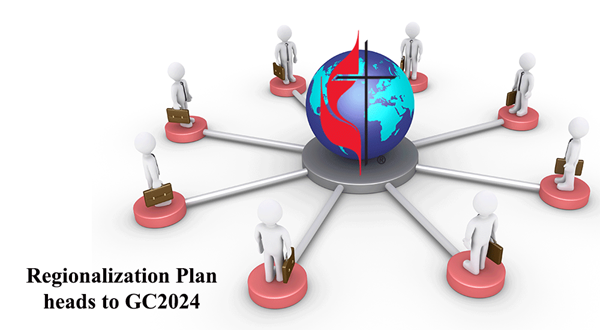The effort to put The United Methodist Church’s different geographic regions on equal footing has crossed a critical threshold.
The Standing Committee on Central Conference Matters, in an online meeting in August, unanimously approved proposed legislation for the denomination’s worldwide regionalization.
That means the plan’s eight petitions are now heading to General Conference, the denomination’s international lawmaking assembly scheduled for April 23-May 3 in Charlotte, North Carolina.
Your support of The General Administration Fund apportionment implements trustworthy administrative oversight like the General Conference sessions.
The standing committee’s vote also means the legislation is more likely to clear the first hurdle faced by all legislation at General Conference — making it out of committee.
The standing committee is a permanent committee of General Conference and deals with matters in central conferences — seven church regions in Africa, Europe and the Philippines. The standing committee also acts as a legislative committee during General Conference. The committee expects to be able to move its recommended legislation to the full General Conference for consideration.
“The shift from central conference to regional conference is a recognition of the maturity of the current central conferences, which were once mission points of the then missionary-sending churches in the U.S.,” Bishop Mande Muyombo, Connectional Table chair, said in a press statement. Muyombo leads the North Katanga Area that encompasses parts of Congo and Tanzania.
“No region can claim to be the center and others the peripheries,” he added. “Our Lord and Savior Jesus Christ remains the center of God’s mission.”
Under the plan, the seven current central conferences and the U.S. would each become United Methodist regional conferences with the same duties and powers to pass legislation for greater missional impact in their respective regions.
The regionalization proposal aims to address what many United Methodists see as a longstanding problem limiting the denomination’s missional effectiveness — namely that the church in the U.S. and the central conferences have unequal standing in decision-making.
The goal is to empower each region to act more nimbly in reaching people for Christ — without waiting for General Conference, which typically meets every four years.
Another goal is to decentralize the U.S. and work toward the decolonization of the global denomination. At present, the U.S. tends to be the default to which central conferences must adjust.
Under the regionalization legislation, regional conferences must uphold the denomination’s constitution and the decisions of General Conference. The proposal also requires each region to operate in harmony with The United Methodist Church’s policies toward racial justice and ecumenical relations.
The worldwide regionalization legislation also leaves untouched the different ways United Methodists around the globe handle bishop elections.
excerpt from a story by Heather Hahn, assistant news editor for UM News
One of seven apportioned giving opportunities of The United Methodist Church, the General Administration Fund implements trustworthy administrative oversight, supports the legislative processes of the church and curates The United Methodist Church’s rich history. Please encourage your leaders and congregations to support the General Administration Fund apportionment at 100 percent.





